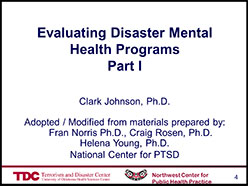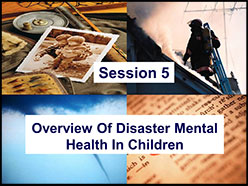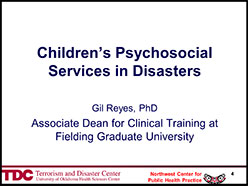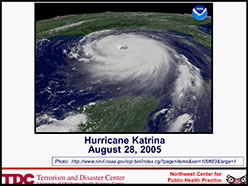Description
This two-part webinar is the fourth session of the series, Disaster Research Training for Children and Families. The series is intended to enhance the infrastructure and to provide the skills, information and resources needed to conduct disaster mental health research with children and families. This session is made up of two 1 1/2 hour webinars, led by L. Clark Johnson, PhD.
Learning Objectives
Part One:
- Types of disasters studied, study designs, sampling issues
- Developmental stages represented
- Post-disaster assessment time points
- Youth self-report vs. parent reporting of youth reactions
Part Two:
- Understand the standards by which the quality of a program evaluation is judged
- Identify the steps in conducting a program evaluation
- Recognize the barriers and challenges in conducting evaluations of disaster mental health programs
- Comprehend the factors that influence capacity for program evaluation
Intended Audience
Local Multidisciplinary Research Team (LMRT) members
Disaster Research Training for Children and Families Webinar Series
Session 1: Disaster Research for Children and Families: Universal Training Module
Session 2: Team Building and Culturally Competent Disaster Research
Session 3: Coping and Resilience for Youth in Traumatic Events
Session 4: Research Methodology and Program Evaluation
Session 5: Children's Disaster Mental Health and Child Mental Health Screenings
Session 6: Early Interventions and Psychoeducational Group Interventions with Children
Session 7: Disaster Research Ethics: Gaps, Challenges, and Team Sustainability
Format
The series of seven training sessions was held online, using iLinc web conferencing software. The initial Universal Training Project lasted 1.5 hours. All other training sessions in this series lasted 3.0 hours. Recordings of these sessions are available below.
Session Four Presenter
L. Clark Johnson, PhD, is a Research Associate Professor in the School of Nursing at the University of Washington. Dr. Johnson earned his doctorate in psychology with an emphasis on research methodology and data analysis. Dr. Johnson has decades of teaching and applied consultative experience in program evaluation, informatics and research design.



